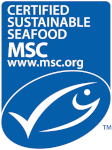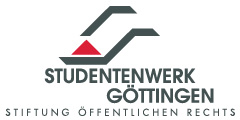Fish from sustainable catch

The Studentenwerk Göttingen was MSC-certified in January 2008 and has since offered some MSC products in its canteens. More information about the Marine Stewardship Council (MSC) can be found here.
Certification Code: MSC-C-51631
What is the MSC?
The MSC is an independent non-profit organisation that has set a global environmental standard for evaluating fisheries. By using the MSC label, which points to the environmentally sound fishing practices of certified fisheries, it wants consumers to opt for products from certified sources when buying fish and seafood.
What is the MSC doing?
The Marine Stewardship Council (MSC) allows people dependent on the fishing industry to promote sustainable fishing. By using the MSC label, sustainably managed operations can show their customers that they have committed to best practices. In addition, the MSC promotes improvements in fisheries management and provides independent evidence of the traceability of sustainable products. The basic mission of the MSC is to reverse the decline in global fish stocks, to protect the marine environment and to demonstrate the business value of responsibly managed fisheries.
What is the MSC standard?
The MSC standard complies with the International Guidelines for the Labelling of Fish and Fishery Products from the Marine Fisheries issued by the Food and Agriculture Organisation of the United Nations (FAO). That is, it is based on sound procedures and the principles of transparency, accountability and independence.
Reusable offer obligation
Please note that we do not fill the canteen food into your own brought lunch box - for these reasons:
Because we offer environmentally friendly bagasse disposable packaging, we are not required by law to accept customers' own lunch boxes. For reasons of hygiene, we do not use this option, as we want to reduce the risk of contamination of food and/or surrounding area during decanting.
However, there is the possibility that you buy the canteen food as usual and transfer it independently at the place into your own lunchbox.
Important: There are no changes concerning own brought cups for the hot drinks!
Information about this can be found here.
Allergen labelling
The designation of 14 allergens, which are most often triggers of allergic reactions and intolerances, has been required by law since 13/12/2014. Therefore, Studentenwerk Göttingen honours the 14 declarable allergens in all canteens and cafeterias.
For frequently asked questions around the topic allergens, we have compiled some information for you here.
Why are allergens labelled?
The labelling requirement is regulated by Regulation (EU) No 1169/2011 (LMIV = Food Information Regulation). It is valid since 13 December 2014. According to this regulation, consumers consider information on allergens in bulk to be very important as it has been found that most cases of food allergies are caused by loose goods. In some cases, food allergic people may develop life-threatening reactions even after consuming the least amounts of the incompatible food. When eating non-home-cooked foods, the risk and anxiety of developing an unintentional allergic reaction is great. In order to increase the quality of life of food allergy sufferers in this regard, the obligation to declare was also extended to lose foods and drinks.
How exactly does the Studentenwerk Göttingen inform its guests?
The aim of Regulation (EU) No. 1169/2011 (LMIV = Food Information Regulation) is to inform allergy sufferers about which of the 14 declarable allergens are contained in the food before purchasing decisions. Our guests have various options to view the food offer and to inform themselves in advance:
- Homepage of the Studentenwerk Göttingen
- Monitors of the dining guidance system in the canteens
- Menu appsInformation system of the cafeterias
- Information provided by responsible employees
Which allergens are labelled?
The 14 declarable allergens are also the 14 most frequent triggers of allergies and intolerances. These are:
1. Gluten-containing cereals and products derived therefrom (namely wheat, rye, barley, oats, spelled, kamut)
2. Crustaceans and products derived therefrom
3. Eggs and products derived therefrom
4. Fish and products derived therefrom
5. Peanuts and products derived therefrom
6. Soy and products derived therefrom
7. Milk and products derived therefrom (including lactose)
8. Nuts and products derived therefrom (namely almonds, hazelnuts, walnuts, cashews, pecans, pistachios, Brazil nuts, macadamia or Queensland nuts)
9. Celery and products derived therefrom
10. Mustard and products derived therefrom
11. Sesame seeds and products derived therefrom
12. Sulphur dioxide and sulphites (from 10 mg / kg or 10 mg / l) and products derived therefrom
13. Lupins and products derived therefrom
14. Molluscs and products derived therefrom
Are also possible traces of allergens in food labelled?
According to the current Regulation (EU) No. 1169/2011 (LMIV = Food Information Regulation), the 14 allergens to be declared are to be mentioned only if they are added to a food according to the recipe. Declaration of traces, so unintentional contaminations of a food with the declarable allergens, are not legally required. Unfortunately, since cross-contamination in large kitchens can never be completely ruled out, traces are not identified by the Studentenwerk Göttingen.
Are there any allergen-free dishes in the facilities?
The Studentenwerk Göttingen does not offer a menu line that does not contain any of the 14 allergens that require declaration. Foods containing these 14 declarable allergens are high quality nutritional ingredients unless you are an allergic. We do not want to do without it in our meals. Due to our wide range and the free choice of components, there is the possibility to avoid the "personal" allergen and still to eat balanced and varied in the Studentenwerk Göttingen.
How does the Studentenwerk Göttingen ensure that all 14 declarable allergens are properly declared?
All products that reach the CampusGastronomie via purchasing and receiving goods must already be declared by the manufacturer. This declaration is transferred to internal documentation systems and enables a correct declaration of the food recipes. These formulas must be strictly adhered to during food production. Furthermore, all kitchen personnel are trained to comply with personal hygiene and regular hygiene standards that must be met before, during and after each step. However, unfortunately, we can never completely rule out unconscious cross contamination by declarable allergens in all these measures.
Which processes in the facilities are important for a correct declaration?
Already the employees who process the product purchase ensure that the purchased products are labelled with the 14 declarable allergens. If the recipes are changed, these employees will be informed immediately by the manufacturers or suppliers. Because this product declaration is the basis of the declaration of all existing food recipes. Both warehouse staff and kitchen personnel are instructed to ensure proper allergen labelling by covering, storing, and preparing food, and adhering to recipes and hygiene regulations. To uncover sources of error and to ensure compliance, all processes are checked regularly.




